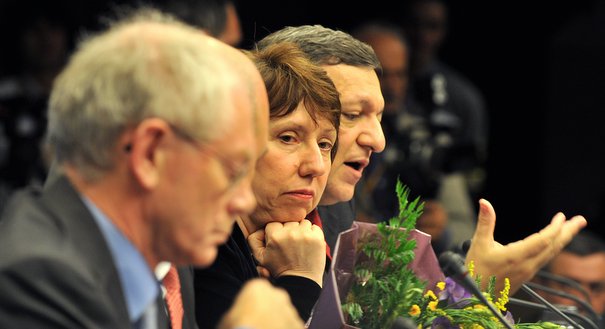When there is nothing you can do about a problem, discuss theory instead. This cynical ground rule applies particularly well to EU foreign policy, that most underperforming part of the European project. As a consequence, there is very little that EU types, devoid of any executive power in foreign policy, love more than discussing the alleged conflict between values and interests.
Few debates in Brussels are so frequent, and few are so futile. Because, in a democracy, values and interests are in reality one and the same thing. The real-life dilemma between idealism and realpolitik is not caused by a structural gap between values and interests. It is caused by time. Or, rather, by the lack of it. Here is why.
Let’s say the EU has important trade relations with some undemocratic but powerful country somewhere in the world. Human-rights advocates will charge realpolitik-driven politicians with selling out European values for good trade relations or for peace and quiet on the political front. Proponents of realpolitik will accuse the supporters of values of preaching from the moral high ground. That attitude will sour relations with powerful partners and undermine economic relations without achieving anything for the victims of government wrongdoing.
In this ritualistic tit for tat, both sides overlook that they actually want the same thing, but that time separates their approaches. Realpolitik points to an urgent need for solving problems in the here and now. This requires compromise and cooperation—and sometimes even collaboration—with dirty regimes.
In contrast, the values-driven approach to foreign policy claims that, in the long run, relations with regimes that trample human rights can be neither stable nor economically profitable. Advocates point to the recent example of the Arab Spring, where short-term concerns over stability cost the West much of its influence and credibility when Arab peoples stood up against dictatorship, cronyism, and oppression. Or they point to Russia, where prolonged insecurity about the rule of law makes investments by Western companies risky or even impossible.
In other words, realpolitik often is concerned with short-term troubleshooting, whereas the values-based approach tends to follow longer cycles. Solving the long-term vs. short-term dilemma is tricky, especially in democracies, where four- or five-year election cycles often lend support to a more short-term way of thinking and acting.
The solution to the dilemma is strategy. Strategy, by its very definition, is a long-term enterprise. Its very core is to identify long-term interests and to draw up a plan of how to pursue them with the tools available. But strategy’s real value lies in the fact that it roots short-term decisionmaking in the bigger picture.
It is often said that even the best strategy falls apart the moment it is confronted with reality. This is true, of course, but only in part. A strategy, and, in particular, the process of devising one, is invaluable for providing a guiding light during hectic crisis management and political improvisation. It reminds us of what we want to stand for, and what goals we can’t lose sight of, even if compromise is temporarily needed. It thus also reminds us of the price we pay when, for whatever reason, we have to violate the values we proclaim.
Even with a strategy firmly in place, the moral side won’t always prevail in those heart-wrenching moments of high-speed political cost-benefit calculations. At times, the values side will still be profoundly unhappy. But an agreed strategy at least forces policymakers to consciously engage in a shrewd and honest weighing of motives and consequences. In times of tough calls, this is extremely valuable.
Strategy, if done right, provides decisionmakers with guidance on moral questions, too. It is the best tool we have to address the democratic dilemma of short-term vs. long-term needs. This is one of the best reasons why the EU should undergo the trouble of writing a new strategy for its foreign and security policy. Admittedly, this is a tedious process that can bring out the worst in consensus-driven European deal-making. Still, the value of having such a document is worth the agony of producing one.
In 2014, the EU’s new high representative, together with the fresh leaders of other EU institutions, should have a stab at it. It would be a very useful undertaking, for various reasons. It would be the best intellectual investment for dealing with the age-old dilemma of values vs. interests. It could work wonders for a better team spirit among the largely disillusioned staff of the European External Action Service.
And who knows? It might even create a little more unity among the EU’s 27 member states.






.jpg)